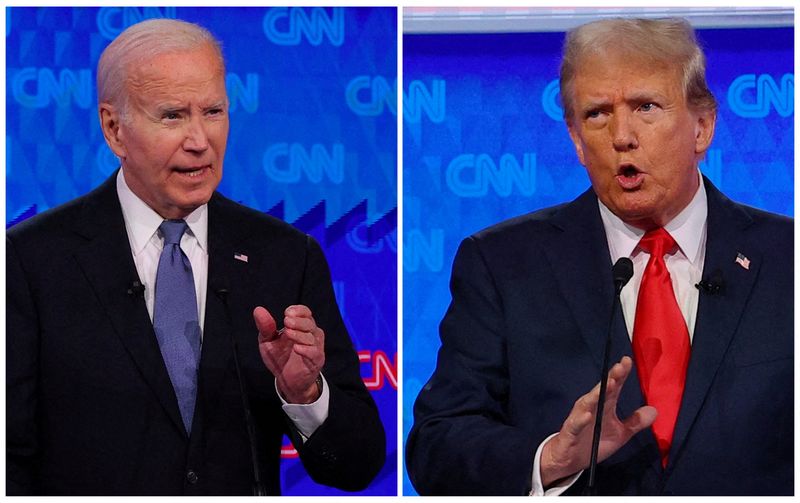(Reuters) - The first U.S. presidential debate saw President Joe Biden turning in a fitful performance, especially at the beginning, as he exchanged barbs with former President Trump on abortion, immigration, the wars in Ukraine and Gaza and even their golf games.
Both candidates defended their handling of the economy ahead of the Nov. 5 election rematch, which opinion polls show has virtually been a tied race for months.
Here is a look at the stocks that are likely to be impacted and how, depending on who comes to power:
FINANCIALS
UBS accounts for the prospect of less stringent capital and liquidity rules and easing financial regulation under a second Trump administration.
The brokerage sees benefits for big banks like JPMorgan & Chase, Bank of America, Wells Fargo and smaller lenders including Discover Financial, KeyCorp (NYSE:KEY) and Synchrony Financial (NYSE:SYF).
SOLAR STOCKS
J.P.Morgan analysts believe opposition to the green revolution by Trump and other Republicans could pose a risk to investments in clean energy manufacturing, facilitated by the tax incentives in the Inflation Reduction Act of 2022.
UBS sees a second Biden government keeping those incentives intact for solar manufacturers such as First Solar (NASDAQ:FSLR), NextEra Energy (NYSE:NEE) and Sunrun (NASDAQ:RUN).
CLEAN ENERGY AND OIL COMPANIES
Continued support for electrification and blue and green hydrogen production under a Biden administration could boost stocks such as Eaton (NYSE:ETN), Quanta Services (NYSE:PWR), Tesla (NASDAQ:TSLA) and Air Products and Chemicals (NYSE:APD), according to UBS.
Existing incentives from the present government would continue driving advantages for energy-efficient product manufacturers such as Johnson Controls (NYSE:JCI) and Trane Technologies (NYSE:TT), as well as waste management companies with recycling infrastructure such as Waste Management (NYSE:WM) and Republic Services (NYSE:RSG).
However, increased oil and natural gas investment, more drilling activity and higher natural gas exports could benefit producers such as Exxon Mobil (NYSE:XOM), Cheniere Energy (NYSE:LNG) and ConocoPhillips (NYSE:COP) under Trump 2.0.
TARIFFS
A second Trump administration is expected to be much more protectionist in terms of import tariffs. "The consumer discretionary sector is exposed in that environment," UBS analysts say.
As president, Trump started a tariff war with China and has floated tariffs of 60% or higher on all Chinese goods and a 10% or higher universal tariff on all imports, a move he says will eliminate the trade deficit.
U.S. tariffs on Chinese imports could help domestic manufacturers, namely legacy carmakers Ford (NYSE:F) and General Motors (NYSE:GM) and steel producers such as Nucor (NYSE:NUE) and Steel Dynamics (NASDAQ:STLD), UBS analysts say.
TRUMP-RELATED STOCKS
Investors expect stocks related to Donald Trump to move in tandem with the chances of his winning the presidency. These include Trump Media & Technology, in which the former president owns a majority stake, software firm Phunware and video-sharing platform Rumble.
PRISON OPERATORS
U.S. prison operators like Geo Group (NYSE:GEO) and CoreCivic (NYSE:CXW) are potential beneficiaries of a second Trump administration, on promises of a crackdown on illegal immigration and restrictions on legal immigration by the Republican candidate, which could boost demand for detention centers.
PHARMACEUTICALS AND INSURERS
UBS sees a lower risk of drug price cuts and an inclination towards Medicare Advantage in a Republican-dominated government, which could help drugmakers Eli Lilly and Company (NYSE:LLY) and Merck, as well as health insurers such as Humana (NYSE:HUM) and UnitedHealth (NYSE:UNH).
M&A-RELATED BENEFICIARIES
A second Trump administration would likely take a more lenient approach to antitrust regulation enforcement in the world's biggest economy, according to J.P.Morgan analysts.
UBS expects banks such as Goldman Sachs, Morgan Stanley, Lazard (NYSE:LAZ) and Evercore, which benefit from M&A activities, to gain from such a policy change.
SEMICONDUCTOR MANUFACTURING
Given the fierce competition with China on semiconductor chips, UBS expects a second Trump government to drive support for domestic semiconductor manufacturing companies such as Applied Materials (NASDAQ:AMAT), KLA Corp, Intel (NASDAQ:INTC) and Texas Instruments (NASDAQ:TXN).

AGRICULTURAL SUPPORT
As more tariffs on Chinese imports are proposed under Trump 2.0, more federal assistance could be provided to farmers for lost exports amid the trade war. These initiatives could help agricultural product manufacturers and suppliers such as Deere (NYSE:DE) and Co and Tractor Supply Company (NASDAQ:TSCO), analysts at UBS say.